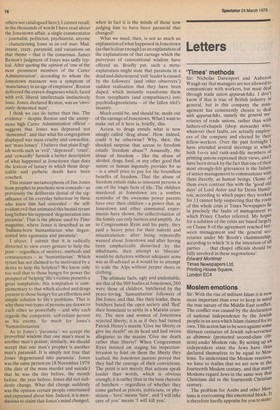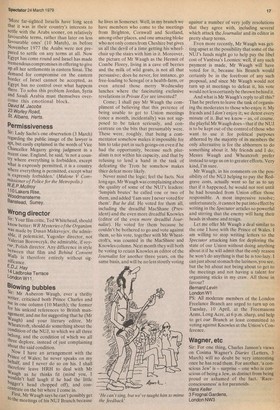Letters
'Times' methods
Sir: Nicholas Davenport and Auberon Waugh say that managers are not allowed to communicate with workers, but must deal through trade union apparatchiks. I don't know if that is true of British industry in general, but in this company the management has consistently chosen to deal with apparatchiks, namely the general secretaries of trade unions, rather than with fathers-of-chapels (shop stewards) who, whatever their faults, are actually employees of the company and elected by their fellow-workers. Over the past fortnight I have attended several meetings at which both f-o-cs and rank-and-file members of printing unions expressed their views, and' have been struck by the fact that one of their most strongly-felt grievances is the failure of senior management to communicate with them directly, as human beings. (Some of them even contrast this with the 'good old days' of Lord Astor and Sir Denis Hamilton, according to which paper they worked for.) I cannot help suspecting that the roots of this whole crisis at Times Newspapers he in precisely the faults of management to which Prince Charles referred. My hopes for a solution of the crisis are based largely on Clause 8 of the agreement reached between management and the general secretaries under Mr Booth's chairmanship, according to which 'it is the intention of all parties . . . that chapel officials should be fully involved in these negotiations'.
Edward Mortimer
Times Newspapers Ltd, Printing House Square, London EC4
Moslem emotions
Sir: With the rise of militant Islam it is now more important than ever to keep in mind the true nature of the Middle East conflict. The conflict was caused by the declaration of national independence by the Jewish people in an area which Islam claimed for its own. This action has to be seen against some thirteen centuries of Jewish subservience as dhimmis (protected second-class citizens) under Moslem rule. By setting up an independent state the Jews have thus declared themselves to be equal to Moslems. To understand the Moslem reaction, we have to realise that we are now in the fourteenth Moslem century, and that manY Moslems regard Jews in the same way that Christians did in the fourteenth Christian century. The problem for Arabs and other Moslems is overcoming this emotional block. It is therefore hardly apposite for you to state: 'More far-sighted Israelis have long seen that it was in their country's interests to settle with the Arabs sooner, on relatively favourable terms, rather than later on less favourable ones' (10 March), as before November 1977 the Arabs were not prepared to settle on any terms at all. Now Egypt has come round and Israel has made tremendous compromises in offering to give Up all her settlements in eastern Sinai. The demand for compromise on the eastern border of Israel cannot be accepted, as Egypt has no control over what happens there. To solve this problem Jordan, Syria and Saudi Arabia must themselves overcome this emotional block.
David M. Jacobs 23 Worley Road, St. Albans, Herts.
Permissiveness
Sir: Lady Sachs's one observation (3 March) regarding the public image of the lawyer is apt, but easily explained in the words of Vice Chancellor Megarry giving judgment in a recent case. England, he said, is not a country where everything is forbidden, except What is expressly permitted, it is a country Where everything is permitted, except what is expressly forbidden.' (Malone V Commissioner of Police for the Metropolis.) WE.P.McIlroy _110 Lakers Rise, woodmansteme Banstead, Surrey.
Wrong director
Sir: Your film critic, Ted Whitehead, should know better: WR Mysteries o fthe Organism Was made by Dusan Makavejev, the admirable, if polemicist, Yugoslav director, not Valerian Borowczyk, the admirable, if voyeur, Polish director. Any difference in style between that film and Behind Convent Walls is therefore entirely without significance. E-04. Hay 14 Ladbroke Terrace London W11.
Blowing bubbles
Sir: Mr Auberon Waugh, ever a thrifty writer, criticised both Prince Charles and me in one column (10 March); the former for his unkind references to British management, and me for suggesting that he (Mr Waugh) and your literary editor, Mr Wheatcroft, should do something about the condition of the NUJ, to which we all three belong, and the condition of which we all three deplore, instead of just complaining about the said condition.
Now I have an arrangement with the Prince of Wales; he never speaks on my behalf, and I never do so on his. I shall therefore leave HRH to deal with Mr Waugh as he thinks fit (mind you, I v4 couldn't half laugh if he had the little °Ilgger's head chopped off), and concentrate on the bit where I come in. First, Mr Waugh says he can't possibly get t° the meetings of his NUJ Branch because he lives in Somerset. Well, in my branch we have members who come to the meetings from Brighton, Cornwall and Scotland, among other places, and one amazing bloke who not only comes from Cheshire but gives us all the devil of a time getting his wheelchair up the stairs with him in it. Moreover, the picture of Mr Waugh as the Hermit of Combe Florey, living in a cave off berries and the milk of wild goats, is not all that persuasive; does he never, for instance, go free-loading to Senegal or a health-farm, or even attend those merry Wednesday lunches where the fascinating exclusive revelations in Private Eye are invented?
Come; I shall pay Mr Waugh the compliment of believing that this pretence of being unable to get to Union meetings (once a month, incidentally) was not supposed to be taken seriously, and concentrate on the bits that presumably were. These were, roughly, that being a commentator somehow makes it impossible for him to take part in such goings-on even if he had the opportunity, because such pluralism is not within his capacity, and that by refusing to lend a hand in the task of defeating the Trots he somehow makes thier defeat more likely.
Never mind the logic; feel the facts. Not long ago, Mr Waugh was complaining about the quality of some of the NUJ's leaders: 'lumpish brutes' he called one or two of them, and added 'lam sure I never voted for them'. But he did. He voted for them all, including the dreadful MacShane (President) and the even more dreadful Knowles (editor of the even more dreadful Journalist). He voted for them because he couldn't be bothered to go and vote against them, so his vote, together with Mr Wheatcroft's, was counted in the MacShane and Knowles column. Next month they will both be voting to retain Knowles as editor of the Journalist for another three years, on the same basis, and will be no less stoutly voting against a number of very jolly resolutions that they agree with, including several which attack the Journalist and its editor in pretty sharp terms.
Even more recently, Mr Waugh was getting upset at the possibility that some of the NUJ's funds might go to help pay the libel cost of Vantssa's Loonies: well, if any such payment is made, Mr Waugh will have voted for it, because his Branch would certainly be in the forefront of any such proposal, and since Mr Waugh would not turn up at meetings to defeat it, his vote would not less certainly be thrown behind it.
And what is Mr Waugh's reply to all this? That he prefers to leave the task of organising the moderates to those who enjoy it. My friends and I don't enjoy it; we detest every minute of it. But we know — as, of course, the playful Mr Waugh does —that if the NUJ is to be kept out of the control of those who want to use it for political purposes abhorred by the majority of its members the only alternative is for the abhorrers to do something about it. My friends and I do; Messrs Waugh and Wheatcroft prefer instead to urge us on to greater efforts. Very kind, I'm sure.
Mr Waugh, in his comments on the possibility of the NUJ helping to pay the Redgrave costs, actually went so far as to say that if it happened, he would not rest until he had hounded from Union office those responsible. A most impressive resolve; unfortunately, it cannot be put into effect by writing in the Spectator articles so powerful and stirring that the enemy will hang their heads in shame and resign.
Let me offer Mr Waugh a deal similar to the one I have with the Prince of Wales. I am willing to stop writing letters to the Spectator attacking him for deploring the state of our Union without doing anything about it if he will admit that the only reason he won't do anything is that he is too lazy. I can just about stomach the laziness, you see, but the bit about not being about to get to the meetings and not having a talent for organising sticks in my craw. All those in favour?
Bernard Levin London W1 PS: All moderate members of the London Freelance Branch are urged to turn up on Tuesday, 10 April, at the Freemasons Arms, Long Acre, at 6 p.m. sharp, and help to get our Branch at least committed to voting against Knowles at the Union's Conference.
Wagner, etc
Sir: For one thing, Charles Janson's views on Cosima Wagner's Diaries (Letters, 3 March) will no doubt be very interesting once he has read them. For another, 'a conscious Jew' is — surprise — one who is conscious of being a Jew, as distinct from being proud or ashamed of the fact. 'Raceconsciousness' is for paranoids. Hans Keller 3 Frognal Gardens, London NW3



































 Previous page
Previous page